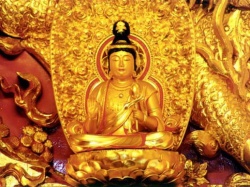Ten powers
(Redirected from Dbang bcu)
Jump to navigation
Jump to search
Ten powers (Skt. daśavaśitā;Tib. དབང་བཅུ, Wyl. dbang bcu) — part of the twenty-one sets of immaculate qualities.
- power over life (tshe)
- power over mind (sems)
- power over material things (yo byad)
- power over action (las)
- power over birth (skye ba)
- power over aspirations (mos pa)
- power over prayer (smon lam)
- power over miracles (rdzu 'phrul)
- power over wisdom (ye shes)
- power over Dharma (chos)
Commentary
Mipham Rinpoche says:
- Power over life means that they can choose to relinquish their life, or, if they choose to remain, live for as long as they wish, even for an infinite number of aeons. This is mainly the result of having been generous.
- Power over mind means that they have mastery over states of meditation and so on at will. This is the result of meditative concentration.
- Power over material things means they can materialize the riches of the gods, human beings or bodhisattvas, just as they wish. This is the result of perfecting generosity.
- Power over action means they have the power to do whatever must be done or whatever they wish.
- Power over birth means they have the power to manifest a variety of births according to their wishes, in whichever place, or in whichever form, or however they choose. These last two powers are mainly the result of discipline.
- Power over aspirations means they have the power to fulfil their disciples' aspirations. This is the result of patiently acting in accordance with disciples' wishes on the path of training.
- Power over prayer means they can perfectly fulfil whatever prayers are made. This is the result of diligence.
- Power over miracles means they have the unimpeded power to display whatever miracles they choose. This is the result of meditative concentration.
- Power over wisdom means they possess the great wisdom which knows, without attachment or hindrance, all that can be known throughout the past, present and future.
- Power over Dharma means they have the unimpeded power to teach, according to the wishes of disciples, all the forms of the Dharma of transmission included within the twelve branches of the excellent teaching. These last two powers are the result of wisdom.
